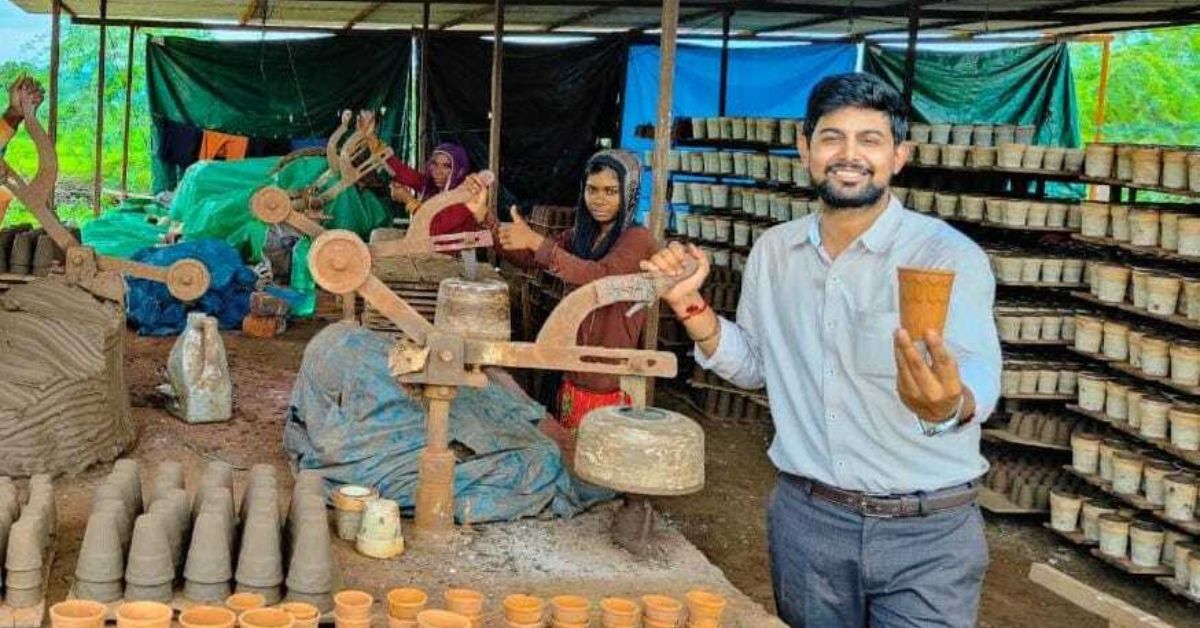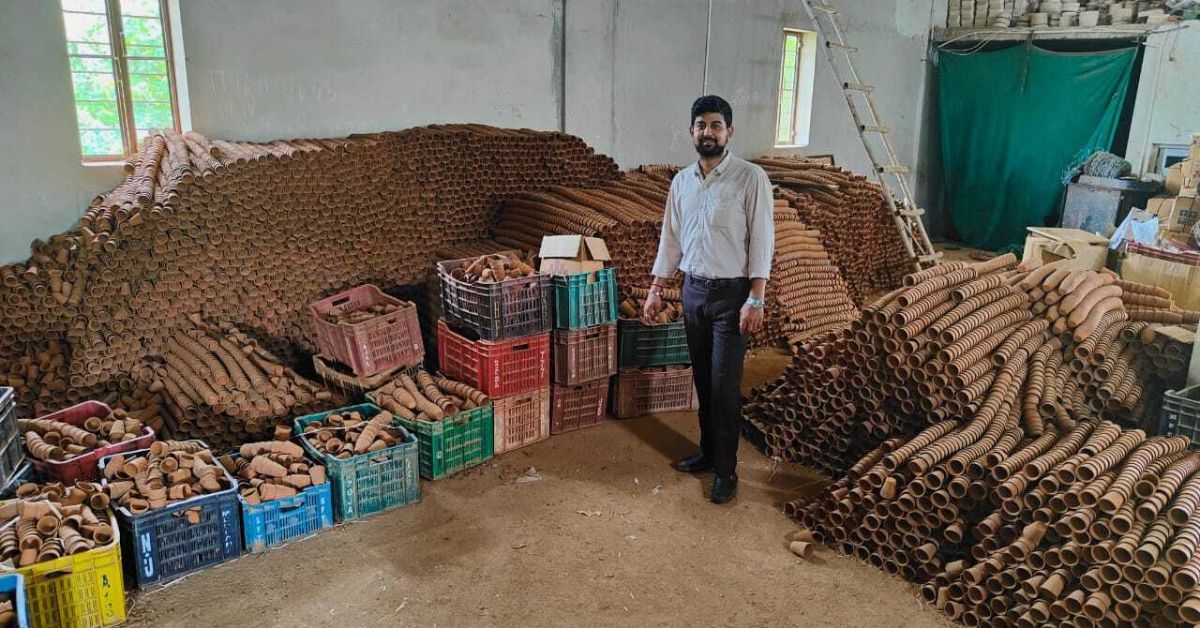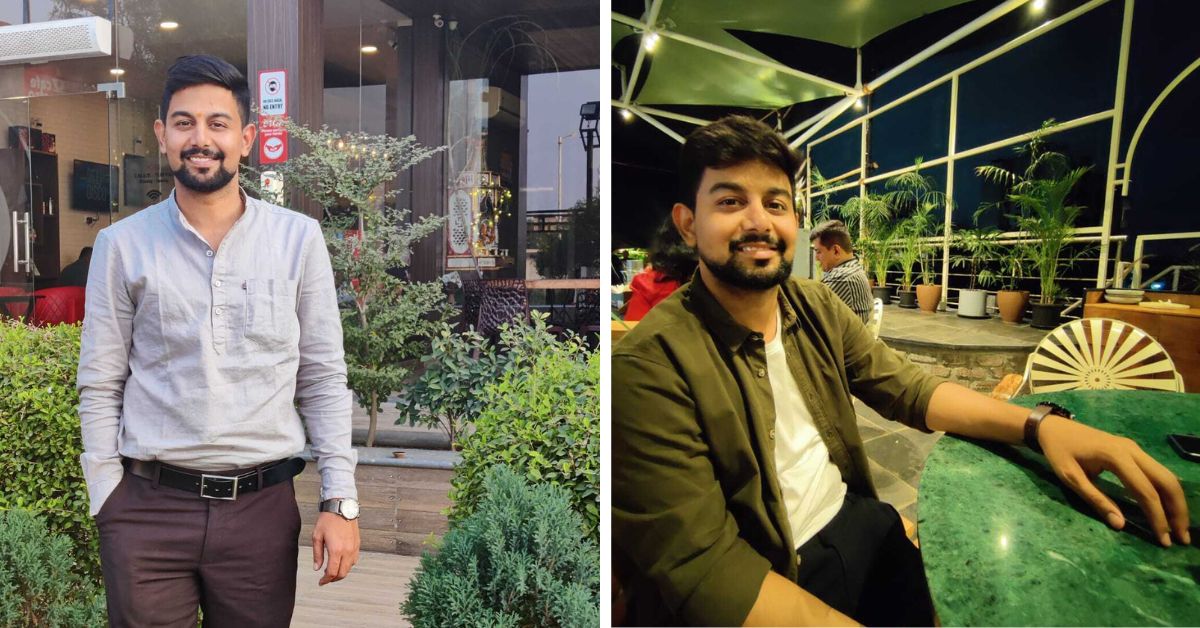Love ‘Kulhad Chai’? Engineer-Turned-Entrepreneur Earns Crores Selling Traditional Clay Cups
Ajmer-resident Shobhit Soni always wanted to start his own company which would be both sustainable, and profit-making. He founded Mittisa, a brand that makes traditional kulhads (clay cups) and sells them across the country. He has also helped set up more than 45 kulhad plants across different states to promote the use of these eco-friendly glasses.

Ever sipped some delightful kulhad (earthen pot) chai on a tapri (a small tea stall) post work or with your college gang? For us tea-loving folks in India, kulhad wali chai isn’t just a drink, it’s an emotion.
However, have you ever wondered where our beloved kulhads come from? Some believe their origin can be traced back to the Indus Valley Civilisation. Through the passage of time, these little pots have become a traditional alternative to plastic cups, which are harmful to the environment and human health.
If you have had kulhad chai in recent times, it is likely that it came from one of Shobhit Soni’s many kulhad plants. “The cups are sustainable and eco-friendly but during delivery, these cups would crack. I could see a gap in the market so I decided to capitalise on this,” the 29-year-old says in a conversation with The Better India.
Presently, Shobhit is the owner of Mittisa — a company that makes earthenware that are 100 percent sustainable and eco-friendly. With his kulhad business, he makes a whopping turnover of Rs 2.76 crore per year.
‘I am a Marwari, business runs in my veins’
Born and raised in a village near Ajmer, Rajasthan, Shobhit was influenced by businessmen all around him. At a very young age, he knew he wanted to be an entrepreneur.
“I am a Marwari’s son, running a business is in my blood,” he laughs off.
After completing his schooling at a local school, Shobhit moved to Pune to pursue a degree in engineering. “After completing my software engineering, I decided to pursue an MBA in international business. I had always been keen on utilising all that I know into building something of my own,” he says.
The idea of making kulhads was born from another business idea that Shobhit pursued.
“In college, whenever we wanted to have a cup of tea, we would locate the nearest tapri to have tea. The tapri vendor would usually have glass cups and kulhads. With glass cups, the hygiene quotient is really low,” he says.
“The way these glass cups are usually washed is by dipping them in soap water and then once in clean water. And with this, they are ready for another use. I always preferred kulhad over glass, or even paper cups. My friends would prefer to pay more for kulhad chai due to its hygienic and environmental reasons,” he adds.

This gave rise to Shobhit’s startup idea — Cutting Meri Wali Chai. “I went to Bengaluru and did a six-month course to learn everything there is to know about tea and tea making. However, the venture had to be put on hold because of the COVID-19 pandemic,” he says.
While trapped at home due to the lockdown, Shobhit’s business-oriented mind did not stop thinking.
“In the short duration of time when we were operable, I noticed a gap in the market. The kulhads that were delivered to us and other businesses would break in transit, resulting in losses. The market seemed very unorganised,” he says.
This laid the foundation for Mittisa.
But how to make crores with simple ideas?
“I decided to invest a sum of Rs 50 lakhs in setting up the factory in Ajmer. I even faced losses because there are little or no resources that you can refer to while setting up this business,” he says.
“Making pots out of clay is an art and it takes some time to acquire the right people for the job. After a few months, I was able to find my footing and the plant started producing 10,000 kulhads a day,” Shobhit adds.
Shobhit’s plant now makes about 60,000 kulhads a day.
“In 2022, a friend suggested that I expand the business beyond just the production of kulhads. While brainstorming, we landed upon this idea of helping others make the same kulhads too,” he says.

Shobhit made a 15-minute video on how one can set up their own kulhad plant. “I knew that everyone would not be able to afford to invest 50 Lakhs in setting up the plant, so I made a plan that will help them do it with minimal investment,” he says.
The plan comes with complete information on setting up of the plant. “The video got a lot of views and people started to reach out to me. The desi way of making kulhad is by hand, but I have developed a machine to do the same. When a customer comes to us, we help them set up their factory, give them the machine and also train them in using it,” he adds.
This costs the people only about a percent of what Shobhit spent on setting up his plant.
“After watching the videos, a lot of aspiring people come to us to learn the process. Once we meet the client, a team goes to their location and, in a matter of 10 days, teaches them to make kulhads from scratch using our machinery,” he says.
Additionally, he also helps them sell their kulhads. “Now that I have been in the business for some time, and also due to the popularity of the video, I get a lot of calls from buyers from different parts of the country. So, say a person from Karnataka wants to buy kulhads, I will locate the plant set up in Karnataka and connect the two. This way the customer gets the product faster and without any damages,” he says.
Shobhit has set up over 45 kulhad plants across India in states including Chhattisgarh, Maharashtra, Karnataka etc. He is also setting up one plant in Canada which will be launched in January next year. By setting up plants in different states, he has formed a network of kulhad-makers across the country.
Not his first attempt at business
Looking back, Shobhit informs that he has tried his hand at various types of businesses before finding success with Mittisa.
“When I was in college, I started a course where I taught students communication skills. I earned a turnover of Rs 22 lakhs in a year. Then, I started an AI company but it had to be shut down due to a dispute among the co-founders,” he says.
“Then there was the chai business before I started the kulhad business. You never know what would hit the right nerve in the market,” he adds.
Something as simple as kulhad has helped Shobhit to earn crores while making a sustainable and eco-friendly product.

“No other cup — be it paper or glass — is as sustainable and eco-friendly as a clay cup. Even when we started our chai business, I was sure that I wanted to use kulhads to serve the tea. With a network of kulhad makers in various parts of the country, businesspersons will have an alternative to run their business eco-consciously,” he says.
Found Shobhit’s business idea interesting? You can reach him at 7300005969
(Edited by Padmashree Pande)
If you found our stories insightful, informative, or even just enjoyable, we invite you to consider making a voluntary payment to support the work we do at The Better India. Your contribution helps us continue producing quality content that educates, inspires, and drives positive change. Choose one of the payment options below for your contribution- By paying for the stories you value, you directly contribute to sustaining our efforts focused on making a difference in the world. Together, let’s ensure that impactful stories continue to be told and shared, enriching lives and communities alike. Thank you for your support. Here are some frequently asked questions you might find helpful to know why you are contributing?

This story made me
-
97
-
121
-
89
-
167











